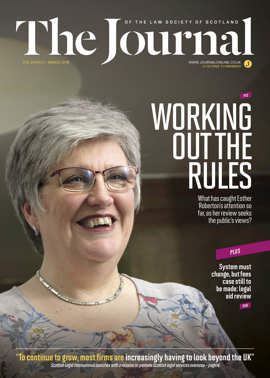Banks, client accounts and the Money Laundering Regulations

The Law Society of Scotland is aware that some banks might be starting to seek additional information from law firms about the client account.
As a result, banks may require law firms to provide evidence of the low-risk nature of their financial relationships.
In practice, where the clients are engaged in activities regulated under MLR, this may mean the law firm being asked to provide confirmation of the existence of internal risk assessments, policies, controls and procedures, or evidence of appropriate risk-based due diligence.
Where the clients are engaged in activities which are not regulated under MLR, such as litigation, it is more difficult to predict how different banks might seek proof from firms that these financial relationships are “low risk”. Solicitors are already subject to Law Society rules and obligations relating to client verification. There is also guidance which states that solicitors should not act as a bank for clients. Given that firms already have to comply with Law Society guidelines, we believe that additional due diligence by the banks is disproportionate. Furthermore, by omitting “low-risk” activities from MLR, the UK Government has implicitly recognised that such activities are inherently low risk for money laundering.
The Society is in discussions with the Law Societies of England & Wales and Northern Ireland, HM Treasury and UK Finance. We are arguing that the banks need to take a proportionate approach given existing obligations on solicitor firms.
Nonetheless, in the short term some banks may request additional information, for example on the types of identity checks conducted on all clients (including clients in unregulated activities), to assess the risk of the relationship with your firm.
Where the banks request specific information relating to individual clients, confidentiality rules might prevent solicitors being able to disclose this information without consent being obtained from the relevant clients.
We would encourage solicitors to contact the Professional Practice team if they find themselves in these situations or if they wish to discuss these issues generally.
In this issue
- Borrowings, partner capital and profitability
- GDPR and the cloud
- Employment claims: is the flood still to come?
- Contributory fault: drivers, cyclists and pedestrians
- Reading for pleasure
- Opinion: Derek McCabe
- Book reviews
- Profile: Siobhan Kahmann
- President's column
- Application changes coming
- People on the move
- Seeking a better way
- Beyond borders
- Drawings and profitability
- Enforceable rights or progressive policy goals?
- Conflict theory: it works
- What the liquidators don't tell you
- The office on the move
- Please can we have some more?
- Health check for doctors' lines
- When creditors come first
- Keeping goods exclusive
- Tenant Farming Commissioner: the story so far
- HSE appeals: experts allowed in
- Scottish Solicitors' Discipline Tribunal
- Please don't stop the music
- Broadcasting's business end
- Public policy highlights
- Scam warnings escalate
- This time it's personal
- The game's not a bogey!
- "Only amateurs attack machines; professionals target people"
- When estate agents need client ID
- Banks, client accounts and the Money Laundering Regulations
- Third party rights: what now?
- Ask Ash






